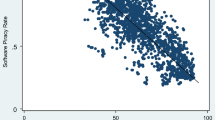Abstract
A number of studies have investigated and found a significant relationship among economic wealth, Hofstede’s national culture dimensions, and software piracy rates (SPR). No study, however, has examined the relationship between economic wealth, culture, and the fact that national SPRs have been declining steadily since 1994. Using a larger sample than has previously been available (57 countries), we confirm the expected negative relationship between economic wealth, culture (individualism and masculinity) and levels of software piracy. The rate of decline in software piracy, however, is found to be a cultural phenomenon, with two factors (power distance (PDI) and uncertainty avoidance (UAI)) working in opposition. Similar results are found for a subset of 37 relatively poor countries. This suggests that, while the rise in economic wealth seen for most countries should lead to a reduction in software piracy, the rate of decline is determined by cultural factors. Global strategies for dealing with software piracy are discussed.
Similar content being viewed by others
References
BSA, 2003, Eighth Annual BSA Global Software Piracy Study (Business Software Alliance). Online: <http://global.bsa.org/globalstudy/2003_GSPS.pdf>
BSA, 2007, Fourth Annual BSA and IDC Global Software Piracy Study (Business Software Alliance/International Data Corporation). Online: <http://www. bsa.org/globalstudy/>
Cheng H. K., R. R. Sims, H. Teegen (1997) To Purchase or to Pirate Software: An Empirical Study. Journal of MIS 13(4): 49–60
Cohen J., P. Cohen, S. G. West, L. S. Aiken (2003) Applied Multiple Regression/Correlation Analysis for the Behavioral Sciences. 3rd edn., Lawrence Erlbaum Associates, Mahwah, NJ, 404
Cohen J. R., L. W. Pant, D. J. Sharp (1996) A Methodological Note on Cross-Cultural Accounting Ethics Research. International Journal of Accounting 31(1): 55–66
Davis J. H., J. A. Ruhe (2003) Perceptions of Country Corruption: Antecedents and Outcomes. Journal of Business Ethics 43(4): 275–288
Getz K. A., R. J. Volkema (2001) Culture, Perceived Corruption, and Economics: A Model of Predictors and Outcomes. Business and Society 40(1): 7–30
Glass R. S., W. A. Wood (1996) Situational Determinants of Software Piracy: An Equity Theory Perspective. Journal of Business Ethics 15(11): 1189–1198
Gopal R. D., G. L. Sanders (2000) Global Software Piracy: You Can’t Get Blood Out of a Turnip. Communications of the ACM 43(9): 82–89
Hair J. F. J., R. E. Anderson, R. L. Tatham, W. C. Black (1998) Multivariate Data Analysis. 5th edn., Prentice-Hall, Upper Saddle River, NJ, 127
Hofstede G. (2001) Culture’s Consequences: Comparing Values, Behaviors, Institutions and Organizations Across Nations. 2nd edn., Sage Publications, Thousand Oaks, CA
Hofstede G., M.H. Bond (1988) The Confucius Connection: From Cultural Roots to Economic Growth. Organizational Dynamics 16(4): 4–21
Hofstede G., G. J. Hofstede (2005) Cultures and Organizations: Software of the Mind. 2nd edn., McGraw-Hill, New York, NY
Husted B.W. (1999) Wealth, Culture, and Corruption. Journal of International Business Studies 30(2): 339–360
Husted B.W. (2000) The Impact of National Culture on Software Piracy. Journal of Business Ethics 26(3): 197–211
IIPA, (2005) 2005 Special 301, Special Mention: Greece␣(International Intellectual Property Alliance). Online: <http://www.iipa.com/rbc/2005/2005SPEC 301Greece.pdf>
Limayem M., M. Khalifa, W. W. Chin (2004) Factors Motivating Software Piracy: A Longitudinal Study. IEEE Transactions on Engineering Management 51(4): 414–425
Marron D. B., D. G. Steel (2000) Which Countries Protect Intellectual Property? The Case of Software Piracy. Economic Enquiry 38(2): 159–174
McSweeney B. (2002) Hofstede’s Model of National Cultural Differences and Their Consequences: A Triumph of Faith – A Failure of Analysis. Human Relations 55(1): 89–118
Merritt A. (2000) Culture in the Cockpit: Do Hofstede’s Dimensions Replicate? Journal of Cross-Cultural Psychology 31(3): 283–301
Moores T. T. (2003) The Effect of National Culture and Economic Wealth on Global Software Piracy Rates. Communications of the ACM 46(9): 207–215
Moores T. T., G. Dhillon (2000) Software Piracy: A View from Hong Kong. Communications of the ACM 43(12): 88–93
Park H. (2003) Determinants of Corruption: A Cross-National Analysis. Multinational Business Review 11(2): 29–48
Peace A. G., D. F. Galletta, J. Y. L. Thong (2003) Software Piracy in the Workplace: A Model and Empirical Test. Journal of MIS 20(1): 153–177
Robertson C. J., A. Watson (2004) Corruption and Change: The Impact of Direct Foreign Investment. Strategic Management Journal 25(4): 385–396
Ronkainen I. A., J. L. Guerrero-Cusumano (2001) Correlates of Intellectual Property Violation. Multinational Business Review 9(1): 59–65
Shin S. K., R. D. Gopal, G. L. Sanders, A. B. Whinston (2004) Global Software Piracy Revisited. Communications of the ACM 47(1): 103–107
Sondergaard M. (1994) Hofstede’s Consequences: A Study of Reviews, Citations and Replications. Organization Studies 15(3): 447–456
The Economist, 2005, “Business: BSA or just BS?” May 21, 2005, pp. 78
USTR, 2005, Special 301 Report: Executive Summary. Office of the US Trade Representative, April 2005 (see http://www.ustr.gov/assets/Document_Library/Reports_Publications/2005/2005_Special_301/asset_ upload_file195_7636.pdf)
Vitell S. J., S. L. Nwachukwu, J. H. Barnes (1993) The Effects of Culture on Ethical Decision-Making: An Application of Hofstede’s Typology. Journal of Business Ethics 12(10): 753–760
WDI (2006) World Development Indicators Online. World Bank, Washington, DC, 2006
Author information
Authors and Affiliations
Corresponding author
Rights and permissions
About this article
Cite this article
Moores, T.T. An Analysis of the Impact of Economic Wealth and National Culture on the Rise and Fall of Software Piracy Rates. J Bus Ethics 81, 39–51 (2008). https://doi.org/10.1007/s10551-007-9479-0
Received:
Accepted:
Published:
Issue Date:
DOI: https://doi.org/10.1007/s10551-007-9479-0




